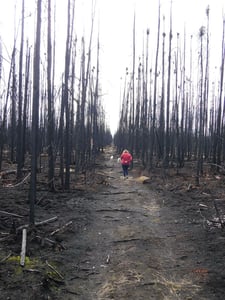 PALMER, Alaska (CN) — Trial has begun for two Alaskans accused of starting the June 2015 fire that ripped through the community of Willow and burned thousands of acres of forest, destroying more than 55 homes and killing pets, sled dogs and wildlife.
PALMER, Alaska (CN) — Trial has begun for two Alaskans accused of starting the June 2015 fire that ripped through the community of Willow and burned thousands of acres of forest, destroying more than 55 homes and killing pets, sled dogs and wildlife.
Anchorage residents Greg Imig, 61, and Amy DeWitt, 43, showed little emotion Thursday as fire officials, some of whom lost their own homes, and neighbors of Imig’s Willow property testified about that dry 80-degree day nearly two years ago. The fire cost more than $8 million to fight, and millions more in material losses.
Willow is a major hub for dog mushers and their kennels, about 2 hours north of Anchorage, and home to the start of the Iditarod Trail Sled Dog Race. Others, including Imig, own secondary property there for recreation away from the city.
About two dozen people, many of them victims of the Sockeye Fire, watched the trial begin. The fire was named for Sockeye Road, where the fire began. Some observers had tears in their eyes, as events were retold for the 10-member jury and Superior Court Judge David Zwink.
Assistant District Attorney Eric Senta detailed the case against Imig and Dewitt, both of whom face 12 criminal misdemeanor charges, including reckless endangerment, criminally negligent burning, leaving a fire unattended with damage to property, and burning without a permit.
Prosecutors say the fast-moving fire started on Imig’s property from one of three unattended burn piles, and that when it got out of control they made little effort to put it out or warn neighbors, other than dialing 911 to report the fire, and then fleeing in their motor home.
“In the end this case is going to be about recklessness,” Senta told the jury. “[They] just sort of shoved a large pile of sticks and leaves against the white spruce forest and lit it on fire. They did nothing to put it out or monitor the fire or watch the fire in any way.”
Senta said the little water Imig and Dewitt had on hand they used to water their lilac bushes.
Witnesses testified they saw the defendants driving away, and that they did nothing directly to warn neighbors or ask for help to contain the fire.
Imig’s attorney disagreed with the prosecution’s characterization of events, saying his client is innocent of all the charges except not having a burn permit. Despite the lack of permit, Fitzgerald said Imig was burning responsibly.
“The defense expects that at the conclusion of the trial, you are going to find that the source pit, what the state has characterized as the source pit, is not only inconclusive as it relates to origin but is not the origin of the Sockeye Fire,” Fitzgerald told the jury.
The defense says the fire started 50 yards north of Imig’s burn pits.
Fitzgerald also seeks dismissal of all charges against Dewitt, who was at the property with her son that day, and who says she left the property to dial 911 three times to report or check on the fast moving fire.
Senta began laying out his argument through the testimony of Leo Lashock, captain of the Willow Fire Department, who lost his home and everything on his property while helping others evacuate, including the immediate neighbor of Imig, Charles Wood.
Wood, who was at his 25-acre peony farm with his wife and a friend that day, had just started watering the peonies from a 500-gallon tank in the back of his pickup. There is no water at the site so they haul water to the property from a nearby gravel pit.
Wood described a wall of fire that he was alerted to when an ember struck his neck. He thought it was a bee sting until he saw the fire engulf his driveway. He felt “utter panic” and said that within 15 minutes, “everywhere I can look there was fire burning.”
Asked if the defendants helped him or alerted him, Wood said, “No.”
He said he and his wife and friend saved what equipment and vehicles they could and then with Loshock and other neighbors went to other neighbors to help them evacuate.
Describing the intensity of the fire and devastation at his own property, Loshock said: “You could shovel the house into buckets. [I lost] everything, I mean everything.”
The trial is expected to take several weeks. If convicted, Imig and Dewitt could be required to pay double the amount of damages caused by the fire, plus the costs of fighting and extinguishing it.
(Photo courtesy of Peter Duncan.)
Subscribe to Closing Arguments
Sign up for new weekly newsletter Closing Arguments to get the latest about ongoing trials, major litigation and hot cases and rulings in courthouses around the U.S. and the world.









